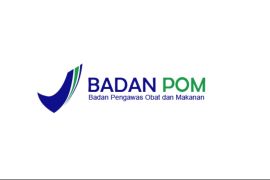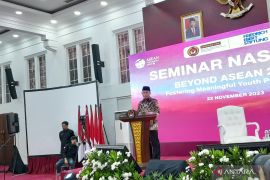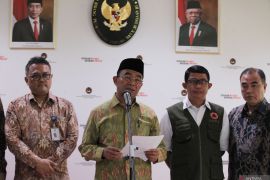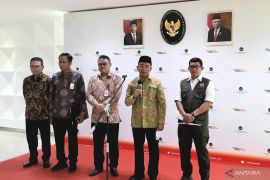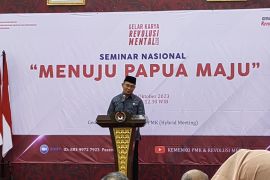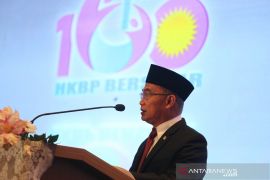The request to the National Police to investigate the case was an agreement resulting from coordination with several ministries, the minister stated.
Effendy said that investigations should be pursued, as based on initial data on syrup raw materials that caused hundreds of Indonesian children with acute kidney failure are imported from a country that is not affected by this case.
The minister delivered the remarks on the sidelines of reviewing evacuation sites for residents affected by landslides in Barjo Alleyway, Kebon Kelapa, Bogor City, West Java, at the Jami Nurul Ikhlas Mosque, Veteran Street, on Saturday.
"We have coordinated with the Health Ministry, National Food and Drugs Agency, Trade Ministry, and Industry Ministry, and we have received inputs from everyone. Last night, I called the National Police Chief, so they would investigate this case of acute kidney failure and gauge the possibility of criminal acts being perpetrated," he explained.
He said that three countries that imported materials for the syrup-based drugs comprised Indonesia, with the most number of cases of over 100 children, with the figure projected to continue to grow; Zambia in South Africa, with 70 cases; and Nigeria in West Africa, with 25 cases.
Effendy remarked that the government will conduct thorough investigation, starting from the origin of the raw material for the syrup, the process of distribution to Indonesia and which pharmaceutical factories received the materials, and the items produced using those materials.
The government will immediately determine whether there was a violation and whether it was criminal in nature, should there be any that was found. This case was critical because it affects minors, especially those aged 10 years and under, with an average of one to six years old --children who are deemed as valuable human resources of the future.
Since the lives of the victims were priceless and invaluable, he expected any violations against them to be met with firm actions.
He revealed that until now, the effects on those who had yet to recover were unknown, given it struck the most vital organ. The government does not want such incidents to recur, so whatever comes up from this investigation on the syrup-drug raw material, the most important aspect was handling with no delay.
The Health Ministry had announced as many as 102 brands of syrup drugs consumed by patients with atypical progressive acute kidney failure in Indonesia.
During the press conference on acute kidney infection accessed here on Friday, October 21, Health Minister Budi Gunadi Sadikin said that his administration had visited 156 patients' homes, and there were 102 syrup medicines in the family cupboards of children affected by acute kidney failure. President Joko Widodo had given directives for the data on them to be disclosed to the public, Sadikin said.
The minister noted that all those syrup drugs were clinically proven to contain polyethylene glycol, which was actually harmless as a syrup drug solvent, as long as its use is within safe limits.
According to Pharmacopoeia and recognized national standards, the safe threshold, or 'Tolerable Daily Intake' (TDI) for EG and DEG contamination is 0.5 mg/kg of body weight per day.
However, if the mixture formula was bad, polyethylene glycol could trigger contamination, such as Ethylene Glycol (EG), Diethylene Glycol (DEG), and Ethylene Glycol Butyl Ether (EGBE), the minister cautioned. Polyethylene glycol is a solvent additive that is rarely noted in the drug product information.
The list of syrup drugs is the result of an investigation by the ministry and National Agency on Food and Drug, and related professional organizations regarding the incidence of AKI in Indonesia since September 2022.
Hence, Minister Effendy appealed to the public to not consume syrup drugs until the government gave clearance. The syrup drugs are temporarily withdrawn from distribution until more information was available from the investigation of cases of acute kidney failure.
"Regarding drugs, actually, there are already a list of hundreds of drugs. I do not know by heart, of the thousands of types of drugs that are in syrup form. However, for the public, I need to remind that it is better to refrain from consuming drugs in the form of syrup, except syrup drugs that have been taken all along on a doctor's prescription. Never buy syrup without a doctor's prescription," he reminded.
Related news: Parents should observe children's urination to prevent kidney failure
Related news: Tackling mysterious acute kidney injury in 241 Indonesian children
Related news: SOEs, hospitals should re-check medicines to prevent AKI: Minister
Translator: Linna Susanti, Mecca Yumna
Editor: Azis Kurmala
Copyright © ANTARA 2022

